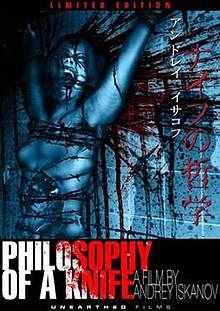Philosophy of a Knife
| Philosophy of a Knife | |
|---|---|
 DVD cover | |
| Directed by | Andrey Iskanov |
| Written by | Andrey Iskanov |
| Produced by | Andrey Iskanov |
| Starring | Yukari Fujimoto Yumiko Fujiwara Svyatoslav Iliyasov Manoush |
| Cinematography | Andrey Iskanov |
| Edited by | Andrey Iskanov |
| Music by | Alexander Shevchenko |
Production company | |
| Distributed by | TLA Releasing |
Release date |
|
Running time | 247 minutes |
| Countries | Russia United States |
| Languages | English Russian |
Philosophy of a Knife is a 2008 Russian-American documentary exploitation horror film written, produced, shot, edited, and directed by Andrey Iskanov. It covers the Japanese Army's Unit 731, mixing archival footage, interviews, and extremely graphic reenactments of experiments performed there.[1]
The film is four hours long and is presented in two parts (Part one and Part two). It was shot in black and white and in English. The interviews are shot in color and have English subtitles.
Plot
[edit]During World War II in China, a Japanese covert division known as Unit 731 conducts gruesome experiments on humans in its research for biological and chemical warfare.
Release
[edit]Philosophy of a Knife was shown at the 2008 Sitges Film Festival.[2] TLA Releasing and Unearthed Films released the unrated film on DVD in July 2008.
Soundtrack
[edit]The film features Manoush and Cyanide Savior's song "Dead Before Born" as well as a song by A. Shevchenko, "Forgive Me", with Manoush speaking the introduction to the track. It also includes an original score by Shevchenko. A selection of tracks named Choice Cuts from Philosophy of a Knife has been released as a limited edition double vinyl, plus a bonus CD by Spikerot Records in 2018.
Reception
[edit]This section needs expansion. You can help by adding to it. (May 2015) |
The Worldwide Celluloid Massacre has Philosophy of a Knife listed as the fifth most disturbing film it has covered, and stated that while it was interesting and intense "I was reminded of Gibson's Passion in that the movie takes an ambitious and difficult subject, then spends most of its time focusing only on gore".[3]
Rob Hunter of the Film School Rejects called it a "crappy exploitation film" and "pseudo-documentary" that could only be worth watching "if all of Iskanov's footage was edited out, and just the documentary footage coupled with the dry, British, informative narration were left".[4] A 0 out of 5 was given by Dread Central's Scott A. Johnson, who concluded, "As a reviewer, one tries to find a few positive things to say about each film. Congratulations are in order for Philosophy of a Knife in that it succeeded in being the crappiest pile of masturbatory, art-house wannabe, pedantic and mean-spirited shit I've ever had the displeasure of watching".[5]
See also
[edit]References
[edit]- ^ DVD Talk
- ^ Philosophy of a Knife, Festival de Cine de Sitges 2008. Retrieved 18 December 2008.
- ^ "Andrey Iskanov". Philosophy of a Knife. The Worldwide Celluloid Massacre. Retrieved November 15, 2012.
- ^ "Foreign Objects: Philosophy of a Knife". Film School Rejects. 2008-09-17. Retrieved 2019-05-09.
- ^ Johnson, Scott (5 July 2008). "Philosophy of a Knife (2008)". dreadcentral.com. Dread Central. Retrieved 15 November 2012.
External links
[edit]- Philosophy of a Knife at IMDb
- Philosophy of a Knife at AllMovie
- Philosophy of a Knife at Rotten Tomatoes
- Review at 10kbullets.com
- 2008 films
- 2008 horror films
- 2008 multilingual films
- 2000s American films
- 2000s English-language films
- 2000s horror drama films
- 2000s Russian-language films
- American black-and-white films
- American horror drama films
- American multilingual films
- American splatter films
- American World War II films
- Russian black-and-white films
- Russian horror drama films
- Russian multilingual films
- Russian splatter films
- Films about Japanese war crimes
- Films set in Manchukuo
- Films set in China
- Films shot in Russia
- Japan in non-Japanese culture
- Second Sino-Japanese War films
- Docuhorror films
- English-language horror drama films
